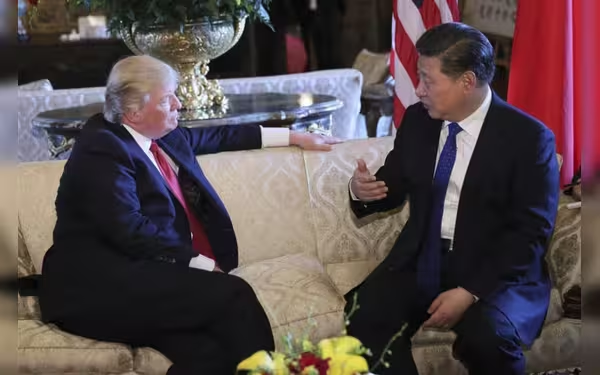Saturday, November 16, 2024 05:44 PM
Trump's Potential Return: Implications for US-China Relations
- Trump may impose tariffs exceeding 60% on China.
- China's economy faces challenges amid potential trade war.
- Technology restrictions could hinder China's AI ambitions.
 Image Credits: asiatimes
Image Credits: asiatimesTrump's potential return could lead to increased tariffs and technology restrictions, impacting US-China relations and China's economic recovery.
As the political landscape in the United States shifts with Donald Trump’s anticipated return to the White House, the implications for international relations, particularly with China, are significant. Trump’s foreign policy, characterized by an "America First" approach, prioritizes U.S. interests and suggests a more isolationist stance compared to the current administration under President Joe Biden. This change in leadership raises concerns for global dynamics, especially for nations like China, which have already faced challenges in their relationship with the U.S.
During his first term, Trump initiated a trade war with China, imposing tariffs that reached as high as 25% on various Chinese imports. This aggressive economic strategy aimed to protect American jobs and industries but resulted in strained relations between the two countries. As Trump gears up for a potential second term, he has hinted at even steeper tariffs, suggesting they could soar to 60% or more. Such measures could further exacerbate the already fragile state of China’s economy, which is grappling with declining property prices, soaring local government debt, and rising youth unemployment.
China's economic recovery heavily relies on exports, and the prospect of increased tariffs poses a serious threat to this strategy. The Chinese government is likely to be on high alert, as the potential for a second Trump presidency could mean not only higher tariffs but also restrictions on technology transfers from the U.S. and Europe. This is particularly concerning for China, which aspires to become a global leader in artificial intelligence (AI) by 2030. Limiting access to advanced technology could hinder these ambitions and slow down innovation within the country.
The return of Donald Trump to the White House could spell trouble for China. With a focus on protecting U.S. interests, the likelihood of increased tariffs and technology restrictions could significantly impact China's economic recovery and its long-term goals. As the world watches these developments unfold, it is essential to consider the broader implications for global trade and international relations. The next few years could reshape the economic landscape, not just for China and the U.S., but for countries around the world that are intertwined in this complex web of trade and diplomacy.













